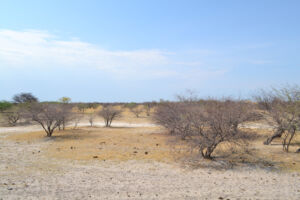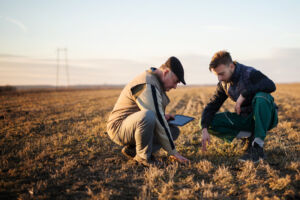Climate change is exacerbating water scarcity, especially in the arid regions of the world. Namibia, with its savannah landscapes, is particularly affected. These ecosystems are among the driest regions in the world and are already threatened by climate change and an increasing pressure from land use. Thus, conventional forms of livestock farming are leading to a deterioration of rangelands which is why the savannah ecosystem is approaching tipping points. Together with partners from Germany and Namibia, a current research project at ISOE has been investigating how climatic, ecological and societal factors are accelerating land degradation in arid regions.
In arid countries such as Namibia, farmers have long experienced irregular rainfall and droughts. At the end of May, the country declared a state of emergency due to the persistent drought. Climate change will further exacerbate this development. By the end of the 2070s, temperatures in Namibia are expected to have risen by up to 4.5 degrees Celsius. This will in turn increase the pressure on the ecosystems of the savannah landscapes which are already overexploited due to intensive grazing. For the future this means that the resulting processes of desertification could lead to the ecosystem being tipped over which could subsequently have a serious impact on the current societal system.
Desertification: How ecology and society are connected
Tipping points reveal the stability limits of socio-ecological systems in which another small change in one particular area can lead to a qualitative change in the entire system. Due to their various uses, ecosystems are closely interrelated with society. Ecological tipping points are therefore generally linked to societal tipping points. If, for example, rangeland is lost for cultivation, farmers might feel the need to migrate since their income is decreasing. Therefore, the research project "NamTip: A Namibian perspective on desertification tipping points in the context of climate change" puts a focus on socio-ecological tipping points - i.e. the interaction between ecological and societal changes. The project team is attempting to fill a gap since to date, there are generally very few conceptual approaches and empirical studies on the socio-ecological interconnection in this area.
NamTip project region Waterberg
While research on ecological tipping points is already established, the transfer of the conceptual approach to societal systems is still relatively new. Here, the characteristics of ecological tipping points are also applied to societal tipping points: These are sudden changes in the status of a societal system that are difficult to reverse and are caused by reinforcing feedback loops. As part of developing a concept of socio-ecological tipping points, the research team is investigating on-site in the Waterberg region of Namibia how ecological and social tipping points are interlinked. The aim is to use the Waterberg region as an example to better understand the socio-ecological system of rangeland management in the threatened savannah ecosystem and to develop suitable measures to prevent desertification processes and promote the restoration of pastureland.
For more about the project please go to:
www.isoe.de/en/nc/research/projects/project/namtip-2
www.uni-potsdam.de/en/namtip
Scientific contact:
Dr. Markus Rauchecker
Tel. +49 69 707 6919-46
markus.rauchecker@isoe.de
www.isoe.de
Press contact:
Melanie Neugart
Tel. +49 69 707 6919-51
neugart@isoe.de
www.isoe.de
Contact:



